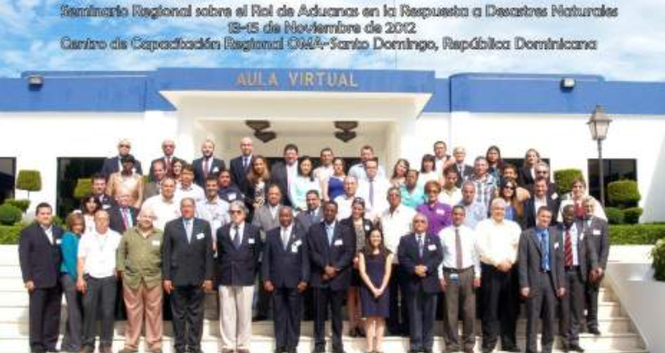
In order to foster experience sharing and to raise awareness among governments and the private sector on the need for national legislations on international disaster relief operations, a regional seminar on the role of Customs in international disaster response was held in the Dominican Republic.
Sixty eight participants, including customs’ officials, members of disaster management authorities, members of Red Cross Red Crescent National Societies, ONGs and international organizations of the Americas and the Caribbean region, gathered from 13 to 15 November for a seminar organised by the World Customs Organization (WCO), the Office for the Coordination of Humanitarian Affairs (OCHA) and the International Federation of Red Cross and Red Crescent Societies (IFRC).
“We hope to encourage states to adopt legislation facilitating the entrance of international disaster assistance” said Valerie Julliand, UN resident coordinator in her opening remarks. Additionally, she noted the extraordinary collaboration of the Dominican Republic during the Haiti operation in 2010, where a humanitarian bridge was set up in less than 12 hours, alongside a number of legal facilities in both countries which ensured the effectiveness and speed of the international response.
Eduardo Rodríguez, Technical Deputy Director of the Dominican Republic Customs’ General Directorate, detailed during his intervention the facilities granted after the Haiti earthquake, highlighting among others the issue of freedom of movement, the creation of a humanitarian air bridge, the simplification of customs requirements and the extension of working hour. He also presented the Dominican Republic’s great step forward in adopting a draft Customs Act Draft which codifies mechanisms tested during the Haiti operation (articles 338 and 339, Title Seven on Urgent Shipments).
Participants discussed, among others, the challenges of customs for the entrance of international disaster assistance, the necessity for coordinated border management and the coordination of the 2010 Haiti earthquake international disaster response. After a presentation on the international and regional legal framework for international disaster assistance, participants examined the recommendations of the Guidelines for the domestic facilitation and regulation of international disaster relief and initial recovery assistance (the “IDRL Guidelines”) as well as the most relevant aspects of the pilot version of the Model Act for the Facilitation and Regulation of International Disaster Assistance (“the Model Act”).
Participants elaborated, in ‘national’ working groups, Action Plans with short-term and long-term steps to be taken to increase legal preparedness for disaster. “Draft a simplified procedure for custom clearance to facilitate the entrance of humanitarian goods in the case of a disaster”, “put in place the measures required to regulate custom tax exemptions during natural disasters” and “promote the adoption of the Model Act to regulate in detail common problems of international disaster assistance”, among other were mentioned by participants in their action plans.
The interactive workshop allowed for in-depth exchange of experiences, opinions and recommendations on good customs practices during disaster response, as well as the identification of gaps that could be filled through a solid domestic legal framework.